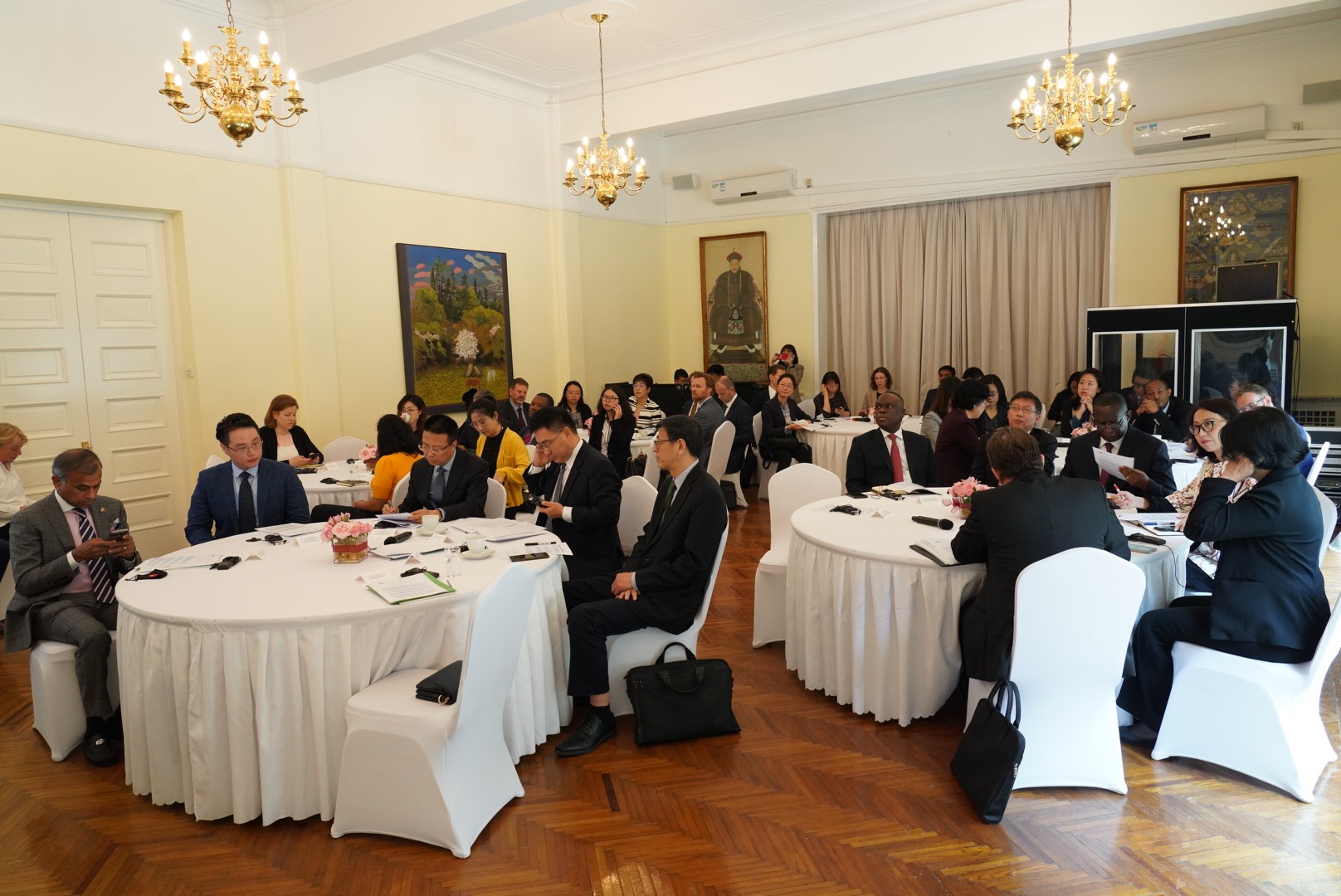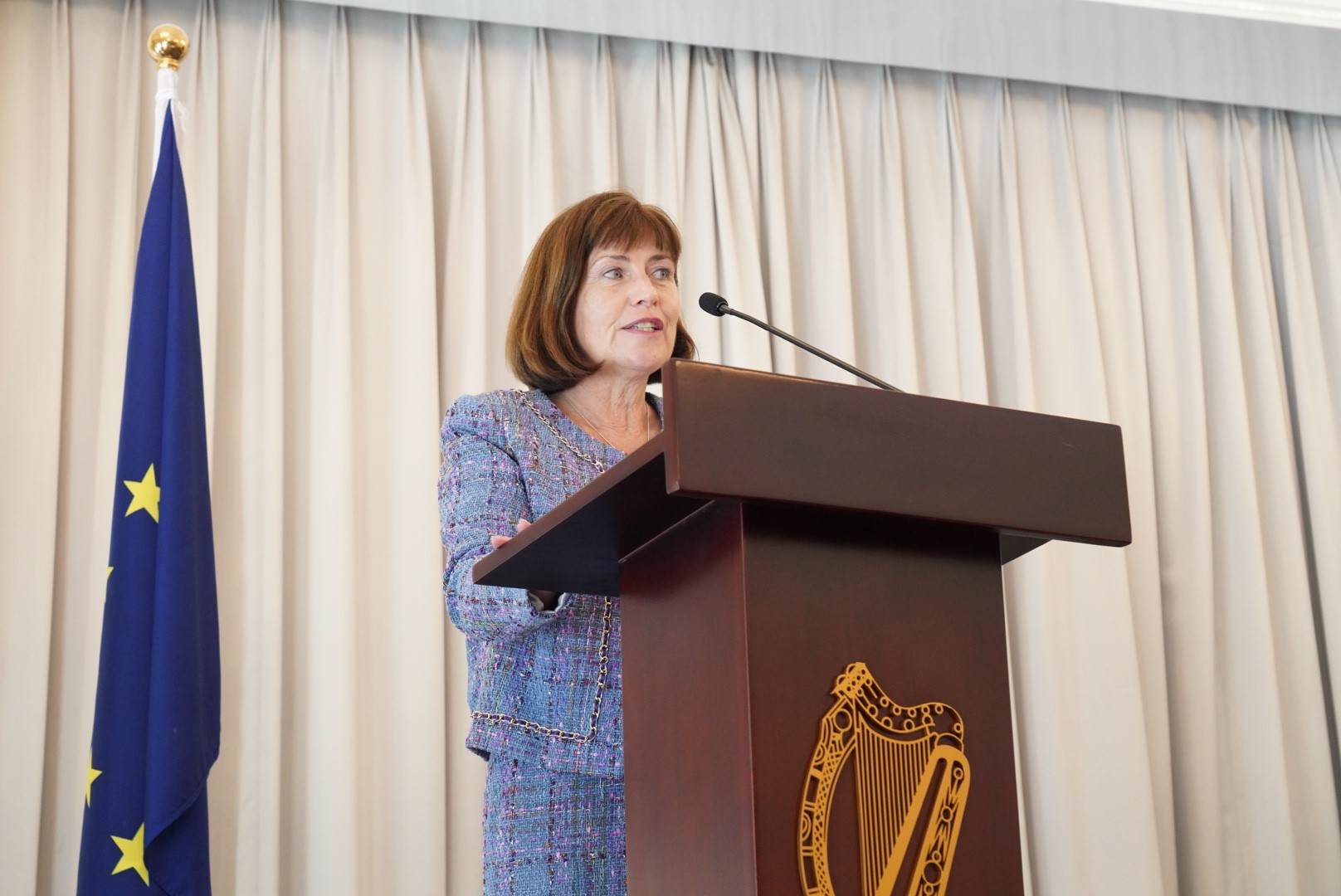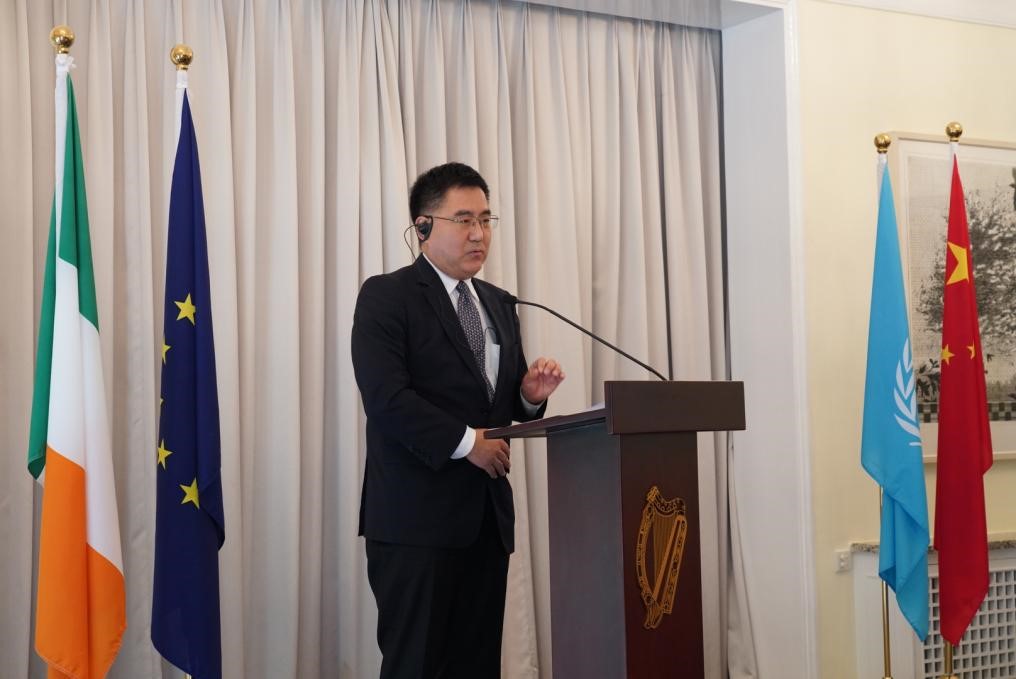联合国驻华协调员常启德:相聚、相联、相互促进——构建可持续发展目标伙伴关系平台,实现粮食安全
近日,联合国驻华协调员常启德就粮食安全、构建新型伙伴关系撰写署名文章《相聚、相联、相互促进——构建可持续发展目标伙伴关系平台,实现粮食安全》。文章如下:
《相聚、相联、相互促进——构建可持续发展目标伙伴关系平台,实现粮食安全》
联合国驻华协调员常启德著

中国南方的水稻梯田
2021年5月14日,联合国驻华系统与爱尔兰驻华大使馆共同主办题为“联合国可持续发展目标伙伴关系平台:实现中国及其他国家的乡村振兴和粮食系统转型”的对话活动。
在这样一个充满意义的时刻,来自政府、国际组织、学术界、智库及私营部门的利益相关方怀揣不同的愿景,共聚一堂、相互联结,就粮食安全议题交换意见。

“联合国可持续发展目标伙伴关系平台:实现中国及其他国家的乡村振兴和粮食系统转型”对话活动
在联合国驻华系统的推动下,来自中华人民共和国外交部、农业农村部和国家乡村振兴局的高层政府官员应邀参与对话。这一活动证明了联合国在这一至关重要的公共政策领域构建伙伴关系新平台的独特地位。
正如中国古话所言:“国以民为本,民以食为天,食以安为先。”
古往今来,农业发展于中国而言一直是重中之重。随着中国崛起,中国人口突破14亿大关,建设一个更加强劲的粮食系统的重要性变得愈发突出。
在过去四十多年间,中国已帮助超过7.5亿人摆脱极端贫困,在减贫方面取得瞩目成就。如果缺乏一个稳定的粮食系统,这一成果是无法达成的,因为减贫与粮食安全息息相关。
这一真理同样体现在2015年由联合国全体成员国一致通过的联合国可持续发展目标中,其中可持续发展目标一和目标二即为“无贫穷”和“零饥饿”,其重要性不言而喻。
2019冠状病毒病疫情威胁、阻碍了过去几十年取得的社会经济进步成果。世界银行的数据显示,到2021年,陷入极端贫困的人口预计将升至1.5亿。此外,世界粮食计划署预计,目前,共有来自35个国家的2.96亿人口面临食品短缺问题。
2019冠状病毒病疫情揭露了世界面临的深度不平等和脆弱性。同样地,由之对国际粮食市场造成的各种负面后果,诸如导致了市场的短缺和中断,凸显了粮食作为关键资源的重要性。
在这一背景下,与会嘉宾展开了讨论,聚焦中国在“十四五”规划中将重心转向实现市场稳定性,以及强调乡村振兴和食品生产能力作为关键发展目标的地位。
在开幕致辞中,爱尔兰驻华大使安黛文指出:“任何政府都无法凭一己之力解决这些非同寻常的全球挑战,特别是在2019冠状病毒病疫情和气候变化的背景下。”

爱尔兰驻华大使安黛文发表开幕致辞
眼下,离在“行动十年”间实现可持续发展目标只有不到十年的时间。眼前的任务要求我们以坚定的政治意愿、大胆的公共政策和与《2030年可持续发展议程》高度一致的伙伴关系破旧立新。
作为前联合国人口基金驻肯尼亚代表及前联合国驻肯尼亚协调员,我亲眼见证了联合国系统与来自中国的华为、美国的默克、荷兰的飞利浦、英国的葛兰素史克、肯尼亚的狩猎通信基金会和肯尼亚医疗健康联合会遵循这一精神、打造公私伙伴关系。
这一伙伴关系帮助肯尼亚政府在一些负担最沉重的偏远地区减少了母婴死亡率。该项目帮助这些县的母婴死亡率减少了将近三分之一。在瑞士达沃斯举行的世界经济论坛上,这一伙伴关系被誉为最佳实践。
这些实践推动了合作以及对新兴技术的使用,构成了联合国肯尼亚可持续发展目标公私伙伴关系平台的基石。这一平台在2017年由时任肯尼亚外交部长在联合国大会上发起。
眼下,创新正在推动发展进程,非洲可以在更短的时间内实现中国在过去几十年间取得的发展成果。但是,各方必须共同努力,促进、落实潜在的进步机遇。
农业农村部国际合作司司长隋鹏飞在参加对话时表示:“我们坚信,农业必须走在中国对外开放和国际合作的前沿。”

农业农村部国际合作司司长隋鹏飞在活动上发言
在联合国驻华系统的推动下,我们可以促进这一可持续发展目标伙伴关系平台的迭代。这是一个潜在的机遇,能够推进中国的乡村振兴事业,并帮助世界实现农业的可持续发展。
正如活动中的讨论环节指出,粮食系统的变革对于中国以及其他发展中国家而言均是一个关键议题,特别是非洲国家。
在非洲,每年有超过40%的农产品浪费于收获后的损失中。尽管非洲应是世界的面包篮子,但其实际上进口了价值近600亿至700亿美元的粮食。非洲在农业经济方面有巨大潜力,到2030年,其产值将升至1万亿美元。
在这方面,中国能做出巨大贡献,实现《2030年可持续发展议程》中畅想的更加美好、繁荣的世界,这一点能够、也应当与世界分享,特别是与发展中国家。
在莫桑比克,引自中国的杂交水稻田的产量超出了该国平均水平的六倍以上,创下了新的国家记录。这是证明中国技术以及与相关伙伴开展合作行之有效的实例。
后疫情的新时代充斥着各种挑战,我们必须重振多边主义,规划类似的行动以应对全球挑战。
近日圆满收官的博鳌亚洲论坛强调了四大发展赤字,即健康赤字、基础设施赤字、绿色赤字和数字赤字。正如我在论坛上指出,要解决这些赤字,就必须消除信任赤字和多边主义赤字。
按照所提出的联合国与中国可持续发展目标伙伴关系平台的构想,以新型公私伙伴关系消除赤字,能够为各方释放人员潜力,创造更多的公共产品并造福世界。
中国国家主席习近平强调了中国食品安全以及“中国碗”、“中国粮”的概念。让我们开启这一征程,携手向前,端稳世界碗,装满世界粮。
英文如下:
《Convene, Connect, Catalyze – Towards a SDG Partnership Platform for Food Security》
By Siddharth Chatterjee
Resident Coordinator of the United Nations in China
On May 14, 2021, a conversation titled "SDG Partnership Platform: Towards Rural Revitalization and Food Systems Transformation in China and Beyond" was conducted by the UN system in China in cooperation with the Embassy of Ireland in China.
In this meaningful moment, multiple stakeholders with different visions from government, international organizations, academia, think tanks, and the private sector convened and connected to exchange ideas on the issue of food security.
With the ability to bring to bear high-level Chinese government officials from bodies such as the Ministry of Foreign Affairs, Ministry of Agricultural and Rural Affairs, and the National Rural Revitalization Administration, the UN system in China in this event showcases its unique position to enable a new arena of partnerships in this vital public policy area.
As the old saying goes in China, "For a country, people are the most important; for its people, food; and as for food, safety."
Agricultural development has been a top priority for China throughout its' history. The emphasis on building a more robust food system became even more evident with its' rise as China's population expanded to 1.4 billion people.
Over the past four decades, China has made remarkable achievements in poverty reduction, lifting over 750 million people from extreme poverty. This outcome could not have happened without a stable food system, with poverty reduction closely related to food security.
This truth is reflected by the United Nations Sustainable Development Goals adopted by all UN Member States in 2015 and the centrality of the first and second goals of 'No Poverty' and 'Zero Hunger'.
The COVID-19 pandemic has endangered and hampered decades of socio-economic progress. According to the World Bank, the number of people pushed into extreme poverty is estimated to rise to 150 million by 2021. In addition, the World Food Programme estimates that 296 million people in 35 countries now face a shortage of food.
The pandemic revealed the deep inequalities and fragilities of the world. Similarly, adverse consequences such as disruption of availability and accessibility in the international food market emphasize the importance of food as a vital resource.
Considering this context, attendees discussed the shift in focus towards achieving stability in China's 14th Five-Year Plan and its' emphasis on rural revitalization and food production capacity as critical development objectives.
In her opening remarks it was the Ambassador of Ireland to China, Ann Derwin, who said “No government is able to address these exceptional global challenges – particularly in light of the COVID-19 pandemic and climate change – alone”.
With less than ten years to achieve the SDGs in the Decade of Action, the task ahead requires us to flip the orthodoxy with determined political will, bold public policy, and new partnerships in deep alignment with the 2030 Agenda.
As former UNFPA Representative and UN Resident Coordinator in Kenya, I witnessed how the UN family, along with Huawei (China), Merck (USA), Philips (Netherlands), GlaxoSmithKlein (UK), Safaricom (Kenya) and Kenya Health Care Federation forged a public-private partnership in this spirit.
This partnership supported the Government's efforts to reduce maternal deaths in some remote and highest-burden counties. There was close to a one-third reduction in maternal mortality in these counties. This partnership hailed as a best practice when invited to the World Economic Forum in Davos, Switzerland.
These efforts, which promoted collaboration and the use of emerging technologies, formed the basis of the UN Kenya SDG Partnership Platform launched in 2017 by the then Foreign Minister of Kenya at the UN General Assembly.
With innovation now advancing development processes, what China has achieved in decades can be completed in Africa in a significantly shorter time frame. Still, all parties must work together to catalyse and enable potential progress.
“We hold this belief that agriculture must be put at the forefront in China’s opening up and international cooperation priorities”, said Sui Pengfei, Director General for International Cooperation of the Ministry of Agriculture and Rural Affairs, during his intervention at this conversation.
The prospect for a new iteration of this SDG Partnership Platform facilitated by UN China is a potential opportunity to advance the cause of rural revitalization in China while helping the world achieve sustainable development in agriculture.
As discussed during the conversation, the transformation of food systems is a critical topic for China and other developing countries, especially in Africa.
Over 40 per cent of Africa's agricultural produce is wasted every year due to post-harvest loss. Africa should be the world's breadbasket, yet it imports nearly US 60-70 billion dollars of food. There is massive potential for agribusiness in Africa, which will rise to US 1 trillion dollars by 2030.
Here, China can make significant contributions to realizing a better and more prosperous world as envisioned in the ‘2030 Agenda', which can and should be shared with the world, focusing on the Global South.
In a recent example of Chinese know-how and work with relevant partners in action, high yield Chinese hybrid rice in the fields of Mozambique have set new national records, achieving production yields more than six times the national average.
As we enter a new post-pandemic era, full of challenges, we must envisage similar actions in a renaissance of multilateralism to respond to our global challenges.
At the recently concluded 'Boao Forum for Asia', four development deficits were highlighted, health, infrastructure, green, and digital. As I stated at the time, addressing these deficits will require us to close the deficit in trust and the deficit in multilateralism.
Closing these deficits with new public-private partnerships as envisaged by the proposed UN China SDG Partnership Platform, can unlock human potential for each side, create more public good and benefit the world.
Just as President Xi emphasized food security in China and the concept of 'China's grain, China's rice bowl', let us start this journey and work with hands joined together to ensure the world's grain and rice bowl.

